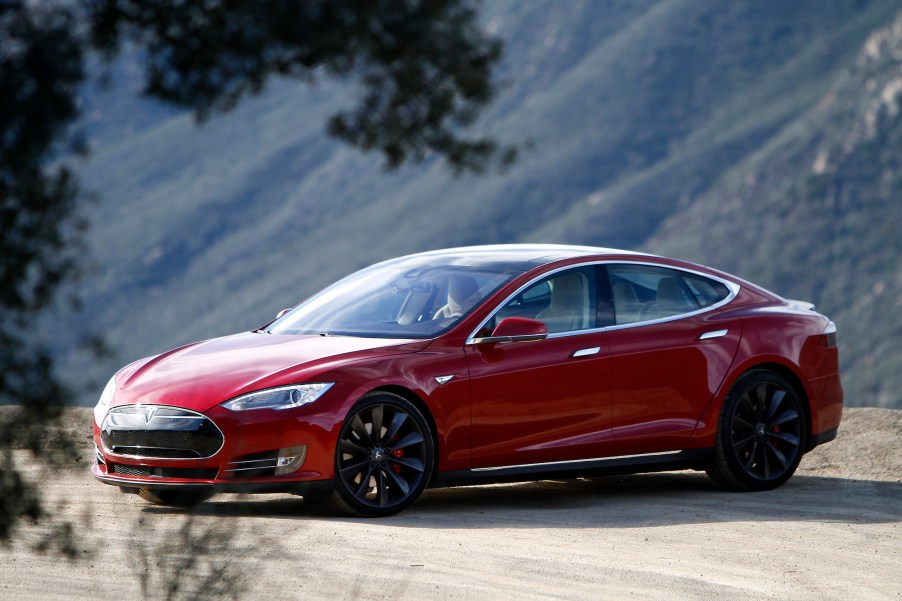
A Tesla Model S Becomes the Brand’s Latest ‘Flamethrower’
Electric vehicles are great for saving money on fuel and maintenance costs, but sometimes that comes at a price. The battery packs can be dangerous, Tesla Model S drivers have discovered.
The Washington Post recently covered yet another Tesla Model S erupting into a blaze after its battery caught fire. And one quote from the car’s owner eerily calls to mind a different Elon Musk-related product.
The Tesla ‘flamethrower’
You might remember that Tesla CEO Elon Musk founded The Boring Company in 2016. A couple of years ago, the infrastructure firm sold actual flamethrowers. It produced 500 of them, and buyers snatched them up for $500 a pop. The hot item sold out in less than a week. But it looks as if this wasn’t the only flamethrower Musk has had a hand in.
Older Tesla Model S cars have had a few incidents with their batteries catching fire. In fact, there were enough complaints to spark a National Highway Traffic Safety Administration investigation over a year ago.
In 2018, the family of a teenager who perished in a Tesla Model S fire sued the EV maker. They claimed a battery defect caused about a dozen of these Tesla models to erupt into flames, either after a collision or while simply parked.
One Model S reportedly caught fire while sitting in traffic on a busy Los Angeles road. And in 2019, a Tesla Model S was seen with billowing smoke before it exploded in a Shanghai parking lot.
What’s up with the Model S fires?
It seems the fires point to a battery defect, which still hasn’t been pinpointed and fixed. The end of 2020 saw the most recent reported incident, from an owner heading home after visiting a local Home Depot.
He told the Washington Post he heard a loud noise, which sounded like someone had dropped “an axle of a normal car.” No sooner had he pulled his 2015 Model S over and exited the vehicle when flames shot from the front wheel well on the driver’s side. The owner said the fire shot out “like a flamethrower.”
He was lucky to have gotten out of the car when he did. That’s because these fires cause another dangerous problem: The cars’ automatic retractable door handles don’t pop out when the vehicle is inoperable. A couple of years ago, one driver died inside a burning Tesla because would-be rescuers couldn’t grab the door handles.
Firefighters also complained that EV battery blazes are much harder to put out than gasoline fires. The chemicals from the lithium-ion batteries fuel fires, so their intensity and duration make them more challenging to extinguish.
Even Tesla’s emergency response guide advises owners to let the fire burn while protecting the surroundings to prevent further damage. The NHTSA suggests that a defect in a single cell of the battery could cause overheating. That heat could cause nearby materials to ignite, making the battery explode.
Do only Tesla EVs have these problems?
General Motors faced similar scrutiny from the NHTSA over the Chevrolet Bolt. There were five reported incidents of those EVs catching fire, resulting in two injuries. GM voluntarily recalled more than 50,000 Bolt models because the high-voltage battery pack could catch fire.
The automaker ended up updating the car’s battery software program to allow it to charge to only 90 percent. It was only a short-term fix to buy GM time to figure out what went wrong and how to fix it.
Audi also had a similar problem. The German automaker recalled its e-tron SUVs after discovering a potential fire risk. Upon investigation, Audi found the culprit: a defective wiring harness. But the automaker received no reports of fires with these all-electric SUVs.
Tesla has seen its share of problems with battery fires. According to the Washington Post, “Since the [NHTSA] agreed to look into the issue last year, little more has been disclosed about the status of the probe.” Let’s hope the luxury EV maker can rectify the situation soon so its Model S is no longer associated with a flamethrower.


